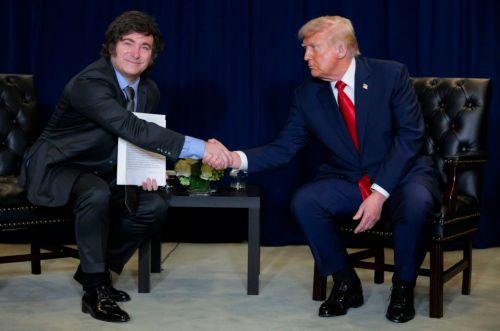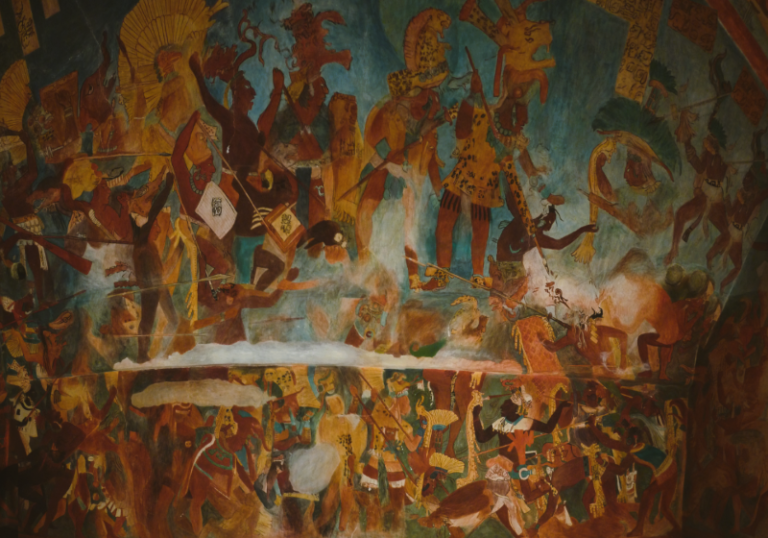

Trump built his movement on the promise that he would fight for America’s forgotten families. Now those families are footing the bill for a libertarian experiment in Argentina.

By Matthew A. McIntosh
Public Historian
Brewminate
Introduction
The Trump administration has unveiled plans for a $20 billion bailout package to shore up Argentina’s embattled President Javier Milei, a move that has startled financial observers and even angered many within Trump’s own Republican Party. Treasury Secretary Scott Bessent confirmed this week that Washington is prepared to extend a massive swap line to Argentina’s central bank and buy up dollar-denominated debt to stabilize the South American nation’s crumbling economy. Supporters frame the intervention as a bold show of solidarity with an ideological ally, but critics, spanning from Senate Democrats to GOP stalwarts like Chuck Grassley, say it contradicts Trump’s “America First” mantra and risks entangling U.S. taxpayers in Argentina’s chronic fiscal turmoil.
For a president who built his political brand on the slogan “America First,” the optics could not be more jarring. Donald Trump is sending a $20 billion lifeline to Buenos Aires, propping up the libertarian firebrand Javier Milei at a moment when Argentina’s economy is teetering on the edge. Bessent confirmed that Washington stands ready to buy Argentine debt and provide standby credit, extraordinary measures usually reserved for systemic crises, not ideological experiments gone sideways.
Supporters call it a necessary hedge against financial contagion in Latin America, or a strategic play to counter Beijing’s growing influence in the region. But Trump’s critics see something more naked: a bailout for a political soulmate whose radical austerity policies have left Argentines reeling. Elizabeth Warren blasted the move as “America Last,” pointing to Argentina’s new soybean deals with China that undercut U.S. farmers. Even Republican stalwarts like Chuck Grassley are bristling, warning that American taxpayers shouldn’t be subsidizing a country competing directly with Iowa grain.
The irony writes itself. Trump slashed foreign aid, pulled funding from USAID programs, and railed against global entanglements, only to open the Treasury’s vault for Milei. If “America First” means anything, it surely isn’t handing over billions to a foreign leader whose domestic approval ratings are tanking and whose policies are sparking protests in the streets of Buenos Aires. This isn’t strategic generosity. It’s ideological indulgence dressed up as geopolitics.
Argentina’s Meltdown and Milei’s Gamble
Argentina has long lived on the edge of fiscal collapse, and Milei promised a radical fix with his trademark chainsaw. He slashed ministries, gutted subsidies, and declared war on what he called the “parasitic state.” But the medicine has been brutal. Inflation remains sky-high, growth has stalled, and ordinary Argentines are watching their savings evaporate. Even his pledge to end the “cepo,” tight capital controls that distorted markets, has only deepened the short-term pain.
Milei bet his political survival on international backing, particularly from Trump. That gamble appears to be paying off. With midterm elections looming in October, his government is touting Washington’s support as a lifeline. But beneath the surface, this is not stability; it is a foreign subsidy propping up an austerity experiment many economists say was doomed from the start.
The Details of Trump’s Bailout
As Reuters reported, the Treasury is preparing a $20 billion swap line with Argentina’s central bank, a mechanism designed to boost confidence in the peso. Bessent went further, saying the U.S. “stands ready” to purchase Argentina’s dollar bonds outright and extend standby credit through the Exchange Stabilization Fund. In plain English: Washington is not just lending Argentina money; it’s moving to underwrite the Milei government itself.
Trump, characteristically, tried to downplay the drama. “I don’t think they need a bailout, but we’ll help,” he told reporters, as if $20 billion were spare change in his pocket. Meanwhile, Milei all but kissed the ring, posting on X that he valued “the friendship of the American people” and promising that Argentina and the U.S. would “build a path of stability together.” He even closed with Trump’s own rallying cry: MAGA.
The optics could hardly be clearer. This isn’t foreign policy. It’s a political bromance underwritten by U.S. taxpayers.
Domestic Backlash
If Trump expected applause for flexing America’s financial muscle, he miscalculated. The backlash has been swift and bipartisan. Grassley, never known as a firebrand, blasted the move as a slap in the face to U.S. farmers: “Farmers VERY upset about Argentina selling soybeans to China right after USA bail out … Meanwhile China is still hitting USA w 20% retaliatory tariff.”
On the other side of the aisle, Warren called it what it is: “Donald Trump wants to lend $20 billion of our money … Argentina just struck a major deal with China that crushes American soybean farmers … ‘America First.’” The sarcasm landed because the contradiction is glaring. Trump cut USAID programs and mocked “globalist elites,” but now he’s writing a check that makes the old foreign aid budgets look like pocket change.
Even within Trump’s own party, the disquiet is palpable. Politico reports that House Republicans are fuming behind the scenes, worried they’ll have to explain to voters why taxpayer money is being shipped to South America while roads and bridges crumble at home. This isn’t nationalism. It’s favoritism masquerading as strategy.
The Strategic Spin
The White House insists this isn’t a bailout so much as a bulwark. If Argentina collapses, the argument goes, the shockwaves could rattle markets across Latin America and strengthen Beijing’s grip. Bessent framed the move as a way to “defeat speculators” and protect stability.
But the problem is that Trump isn’t treating this as sober statecraft; he’s treating it as a personal project. Milei isn’t just another head of state; he’s Trump’s ideological twin. By tying U.S. policy so explicitly to Milei’s fate, Trump has turned foreign assistance into political theater.
If this were really about containing China, the administration could have worked through the IMF or coordinated with the G20. Instead, Trump chose the unilateral route, a $20 billion show of force that bypasses guardrails and puts U.S. taxpayers on the hook. This isn’t strategy. It’s indulgence.
Analysts Call Foul
Economists argue the package is a patch, not a cure. The Financial Times pointed out that the plan still leans heavily on IMF backing, and markets remain unconvinced. As Newsweek put it, “Argentina took a chainsaw to its economy. It now needs U.S. help.”
Meanwhile, protests and slipping approval ratings have left Milei politically fragile. Americas Quarterly warned that his coalition may not hold. Markets know a bailout can’t buy legitimacy, and Trump has just tethered America’s credibility to a shaky experiment.
The Stakes in Argentina
If the bailout was meant to buy Milei breathing room before the October 26 midterms, it may instead backfire. On paper, the package shows Milei has friends in high places. But at home, it looks like dependency. Opposition parties are seizing on it as proof his reforms have failed, accusing him of trading sovereignty for survival.
As The New York Times noted, Milei’s popularity is sliding. If voters turn against him, Trump will have tied billions of American taxpayer dollars to a collapsing political project.
The Contradiction Exposed
This is the paradox Trump can’t escape. He promised to end costly foreign entanglements, yet he’s created one of his own. He mocked nation-building, yet he’s underwriting Milei’s libertarian nation-breaking. He swore to put American farmers first, yet he’s writing checks while Argentina sells soybeans to China.
So what is “America First” now? To many, it looks less like a doctrine than a brand, invoked when convenient, discarded when inconvenient. And the bailout for Milei may go down as the most expensive rebrand yet.
Conclusion: Hypocrisy at Scale
The Trump–Milei bailout is more than a financial package; it’s a test of what “America First” really means. If Milei steadies Argentina, Trump will claim victory. But if the bailout fails (if protests swell, if inflation spikes, if Milei’s coalition cracks) then America will have spent $20 billion underwriting chaos.
By tying U.S. resources to Milei’s fate, Trump has blurred the line between strategy and loyalty. To allies and adversaries alike, the message is clear: America’s foreign policy is driven less by principle than by the president’s personal affinities. That may win applause in Buenos Aires, but at home it looks like betrayal.
Trump built his movement on the promise that he would fight for America’s forgotten families. Now those families are footing the bill for a libertarian experiment in Argentina. That’s not “America First.” That’s hypocrisy at scale, and it’s written in the ink of a $20 billion check.
Originally published by Brewminate, 10.02.2025, under the terms of a Creative Commons Attribution-NonCommercial-NoDerivatives 4.0 International license.


